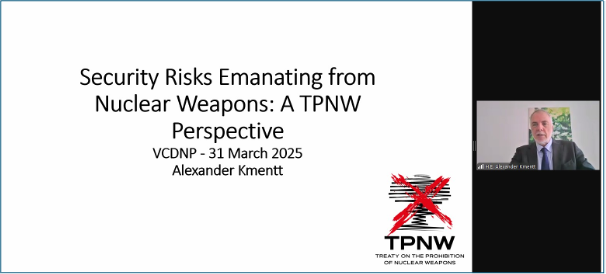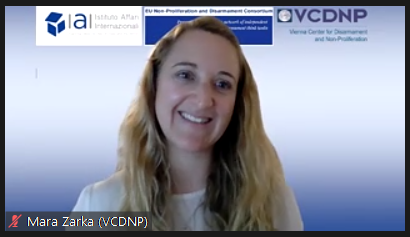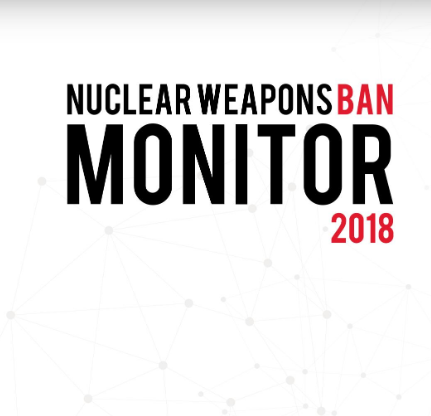
On 31 March 2025, the VCDNP hosted a webinar to discuss the report of the consultative process on security concerns of States Parties to the Treaty on the Prohibition of Nuclear Weapons (TPNW). The report aims to bridge the gap between humanitarian and security-centred discourses on nuclear weapons in international forums.
Ambassador Alexander Kmentt, Director of the Disarmament, Arms Control and Non-Proliferation Department of the Austrian Ministry for European and International Affairs, coordinated the consultative process and presented key arguments and recommendations of the report. Dr. Oliver Meier, Policy and Research Director at the European Leadership Network, provided commentary. VCDNP’s Gaukhar Mukhatzhanova moderated the discussion.
The consultative process was established at the Second Meeting of TPNW States Parties in 2023 to better articulate their security concerns related to nuclear weapons, and to challenge the nuclear deterrence paradigm by juxtaposing it with scientific evidence on humanitarian consequences and risks inherent in nuclear deterrence. Introducing the report, Ambassador Kmentt argued that it demonstrates that the TPNW “is a security treaty”, as articulates serious and legitimate security concerns, based on scientific facts about the consequences of nuclear weapon use and testing.
Ambassador Kmentt highlighted three central concerns elaborated in the report: First, that nuclear weapon use would produce "transboundary, complex, and cascading" consequences affecting all humanity. Second, the risks of nuclear detonation are "exacerbated by growing salience on nuclear weapons, heightening political tensions, careless rhetoric, and new technologies". And third, nuclear deterrence relies on "assumptions of stability, predictability, and rationality" that may not hold true.

Questioning the security benefits of nuclear weapons, the report argues that it is impossible to prove or disprove definitively that nuclear deterrence was the main factor that prevented large-scale conventional war and nuclear conflict since 1945. It further highlights the uncertainty of nuclear deterrence preventing wars in the future and argues that, as a human construct reliant both on psychology and technology, nuclear deterrence is bound to fail eventually. Weighed against the information on the consequences of nuclear weapon use, this uncertainty presents an unacceptable risk for TPNW States.
“The crux of the matter”, Ambassador Kmentt summarised, “is that the security policy approach of one side of the argument creates security concerns for the other side of the argument".
Dr. Meier praised the report as a useful compendium of findings on the humanitarian consequences of nuclear weapons and arguments against reliance on nuclear deterrence. He also noted that the report updated the debate on nuclear risks since the time of the TPNW’s negotiation, taking into account newer developments, such as emerging and disruptive technologies.
At the same time, Dr. Meier criticised the tone of the report and pointed out that the characterisation of nuclear deterrence as “a dangerous, misguided, unsustainable and unacceptable approach to security” was not conducive to a constructive discussion with States that “view nuclear weapons from a strategic stability perspective".
Dr. Meier suggested several issue areas for engagement, including transparency, risk reduction, security assurances, and victim assistance. The two speakers agreed that the review process of the Treaty on the Non-Proliferation of Nuclear Weapons (NPT) was the most appropriate forum for a substantive discussion on risks, threats, and security perceptions. They acknowledged, however, the difficulty of initiating such a frank conversation within the current review process structure.
Both speakers noted that little is known about how nuclear-weapon states take into account humanitarian consequences and mitigation needs in their nuclear planning. In this regard, they agreed that questions about these considerations and compatibility of nuclear policies with international humanitarian law should be part of the transparency discussions under the NPT.
The speakers also agreed on the importance of discussing a range of measures to reduce the risk of use of nuclear weapons. Ambassador Kmentt pointed out, however, that the nuclear-weapon States' framing of risk reduction is “far too narrow” and does not address risks emanating for the practice of nuclear deterrence itself.
The webinar highlighted the urgent need for substantive dialogue on nuclear risks. Ambassador Kmentt called for acknowledging the uncertainties surrounding nuclear deterrence and adopting a prudential approach to preventing escalation in an increasingly precarious global environment.
Dr. Meier emphasised the importance of engaging with alternative perspectives and finding common ground, even when consensus seems distant. Both speakers agreed that the report could serve as a valuable tool for advancing discussions between TPNW supporters and sceptics.
"The situation is dire; we are on the cusp of sliding into a much more dangerous world", Ambassador Kmentt warned in closing. "Please read the report and make up your own mind on the arguments that are being put forward".
This webinar was made possible thanks to the support of the Austrian Federal Ministry for European and International Affairs.


